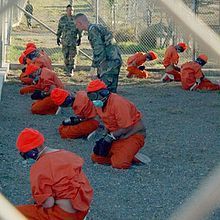
The Guardian reports that US President Barack Obama said during a briefing today that he has ordered a review of the Guantánamo Bay, Cuba prison for terrorist suspects and will renew his push to close the prison. "I'm going to reengage with Congress", he said, adding, "It is expensive. It is ineffective. It hurts us in terms of our international standing ... it is a recruitment tool for extremists." 100 of the 166 inmates at the prison are participating in a hunger strike as of this morning, according to the New York Times. Medical personnel have gotten approval to feed nutritional supplement Ensure to 21 of the inmates through tubes inserted through their noses.
While pledging to reengage with Congress, Obama stated his opposition to keeping prisoners "in no man's land in perpetuity" and said "the idea that we would still detain forever a group of individuals that have not been tried, that is contrary to who we are, that is contrary to our interests and it has to stop."
In January 2009, shortly after being inaugurated, Obama signed an executive order to close the detention facility in one year, according to an AtlanticWire timeline of the president's actions on Guantánamo. In December of that year, he ordered the federal government to acquire a prison in Thompson, Illinois to house the suspects - many of whom would be held indefinitely as "law of war" detainees, ineligible for prosecution but too dangerous to release. If released, the suspects would be transferred out of the country or brought to trial, not released within the United States.
The plan was met with significant opposition in Congress, which denied funding for the plan, to a large extent out of an unwillingness to hold prisoners in their own backyard. There was also criticism from quarters farther to the left. "The only thing that President Obama is doing with this announcement is changing the ZIP code of Guantánamo," said Tom Parker, Amnesty International USA policy director, in 2009.
In May 2010 The House Armed Services Committee approved legislation prohibiting detention centers inside the United States.
An April 2011 plan to prosecute 9/11 mastermind Khalid Sheik Mohammed in federal court fell through, and Sheik Mohammed was returned to Guantánamo for trial.
As recently as January 28 of this year, the State Department shut down the office of the envoy for closing the prison.
In April, prisoner Samir Naji al-Hasan Moqbel - one of the hunger strikers - told lawyers his story, which was published in a New York Times op-ed.
© 2025 Latin Times. All rights reserved. Do not reproduce without permission.




